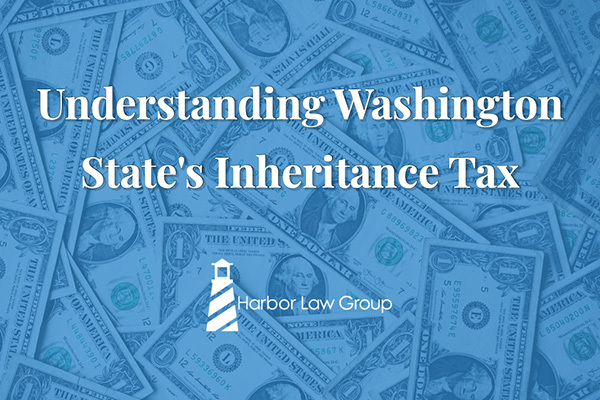Washington State Inheritance Tax: What You Need To Know
Let’s start with the basics – Washington State has an estate tax. As you splutter out that sip of coffee, prepare yourself for another truth – that tax floor starts at just $2.193 Million.
After working a lifetime to build what you have, you want to make sure it goes to your family, not the government!
This Washington tax begins at 10% and rises to 20% on a graduated scale, which may result in a significant tax burden against your estate. Remember, your “estate” includes life insurance, retirement, the value of your house, etc. So, although you may not feel like a millionaire, you could be worth millions upon your passing! If you’re like me, you don’t want to pass on needless financial woes to your spouse or children. While it may be a difficult subject, it is vitally important to meet with an estate planning attorney to discuss what could happen to your assets upon your death. Even if you already have a plan, life circumstances change continuously. Building a relationship with an experienced estate planning attorney alleviates unnecessary stress and allows you to address your changing estate throughout your lifetime. A carefully crafted estate plan creates a future for your loved ones free of financial confusion.

What Is the Washington Estate Tax?
An estate tax is the tax imposed on a person’s estate prior to its distribution after their death. Strategic estate planning may aid in avoiding or limiting payment of these estate taxes. Sometimes, however, estate taxes may be unavoidable when dealing with a large estate at both the state and federal level.
Federal estate tax laws include an exclusion amount that defines what portion of a deceased person’s estate passes free of federal estate tax. The federal tax exclusion amount for estate taxes in 2020 is presently $11,580,000, which is scheduled to sunset to a lower level in 2026. As stated above, Washington State’s basic exclusion amount is much, much lower at 2.193 Million per person. Without careful planning, many estates may exceed this minimum and be subject to costly taxes. By way of example, an estate worth $3.193 Million will owe $100,000 to the State of Washington in estate taxes! Ahem… is this the kind of legacy you’d like to leave to your kids? But let’s talk turkey – Married couples benefit from an unlimited marital deduction that allows them to avoid paying estate taxes when property passes from a deceased spouse to a surviving spouse. The problem with this strategy is that it can have unintended tax consequences as it increases the value of the surviving spouse’s estate, possibly subjecting them to estate taxes when they ultimately pass.
Federal law addresses this situation by permitting a surviving spouse to apply any exemption remaining from a deceased spouse’s estate to their own estate under what is known as the “portability” rule. This portability rule, however, has significant drawbacks and limitations, so I encourage our clients not to rely on that for federal estate tax purposes.
In Washington state, however, there is no such portability rule! Without careful estate planning, the first spouse can “lose” his estate tax exemption, leaving only the surviving spouse’s exemption amount. Don’t be caught in this trap!
Does Washington State Have an Inheritance Tax?
In Washington State, there is no inheritance tax. An inheritance tax requires beneficiaries to pay taxes on assets and properties inherited from a deceased person. Inheritance taxes differ from estate taxes as inheritance taxes apply to the beneficiary. The focus of estate taxes is on the value of a dead person’s assets and whether it exceeds the estate tax threshold. Only six states impose an inheritance tax. Those states are Maryland, Nebraska, Kentucky, New Jersey, Pennsylvania, and Iowa.
Inheritance taxes are based on where the decedent lived, not where the beneficiary lives. So if you live in Washington and leave money to someone who resides in one of these states, they will not owe inheritance tax. On the other hand, if you inherit from someone who lived in a state that imposes inheritance taxes, you may be required to pay your share.
How Do I Know If I Need to File a Washington Estate Tax Return?
A Washington estate tax return is required if the estate value is more than the state tax exclusion amount of $2.193 million. If the estate’s gross value is less than this exclusion amount, you may do nothing.
What Can I Do to Save on Washington Estate Taxes?
If your estate is worth more than the $2.193 million tax exemption, it is possible to pass a portion or all of this amount while avoiding estate taxes. For example, for a married couple, the first spouse to die could create a will or living trust that creates two (or more!) shares upon their death. Generally speaking, the first share will hold the deceased spouse’s share of $2.193 million in what is known as a “bypass” or “shelter” trust.. The remaining share may pass to a QTIP (qualified terminable interest property) or marital deduction trust. In short, the first share is excluded from the estate tax due to the exemption. The second share avoids estate tax as it passes under the unlimited marital deduction. (Bonus! In addition to estate tax avoidance, these trusts offer some level of asset protection, depending on how they’re drafted!)
Your estate planning attorney can advise you of the various options that may be available to minimize your tax burden.
Does It Make Sense for Me to Hire an Attorney to Help?
Estate taxes are incredibly complex and difficult to understand without legal and tax assistance. Almost more importantly, managing a loved one’s affairs while attempting to administer an unplanned estate can be a monumental, emotional, and burdensome task. At The Harbor Law Group, we are well-equipped to help your family avoid or minimize estate taxes, while offering first-rate care and attention throughout the process. We treat every client as an individual and do not employ cookie-cutter solutions to any client’s legal issue. We develop committed, long-term relationships with our clients and understand the importance of planning for your future. Estate planning is, in truth, legacy planning, and should be a priority for all families, no matter your financial situation. Contact The Harbor Law Group for a free consultation regarding your estate plan!




